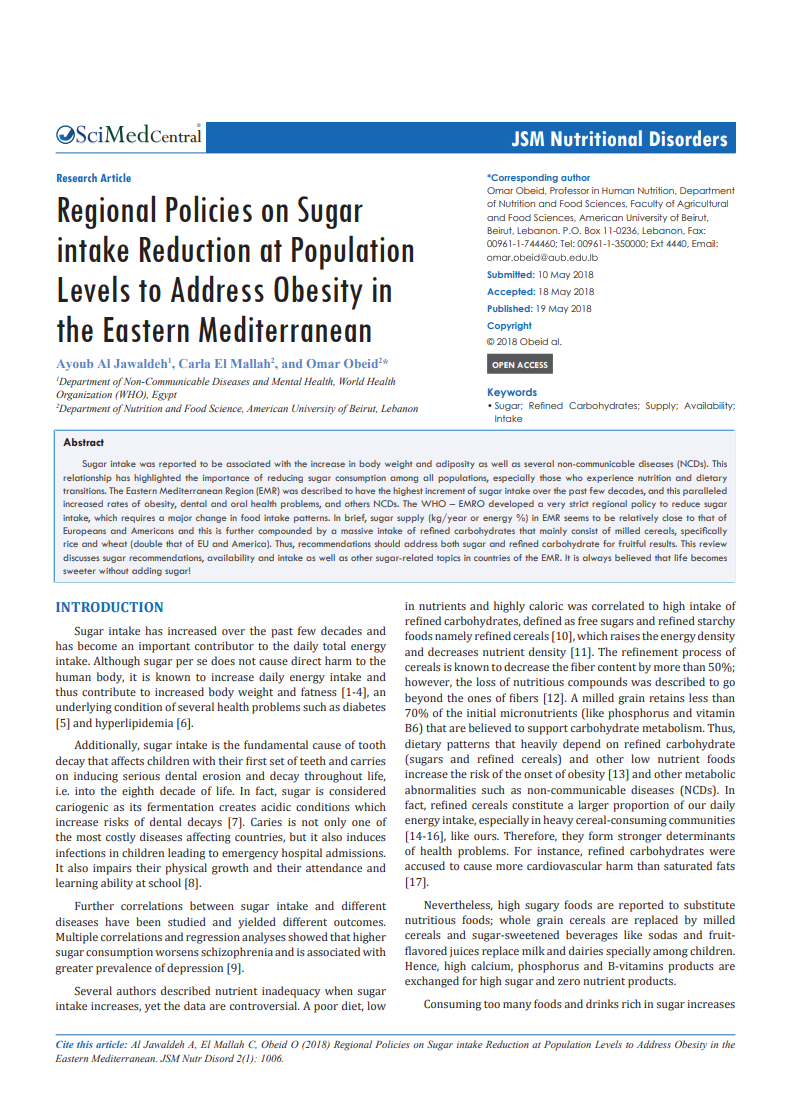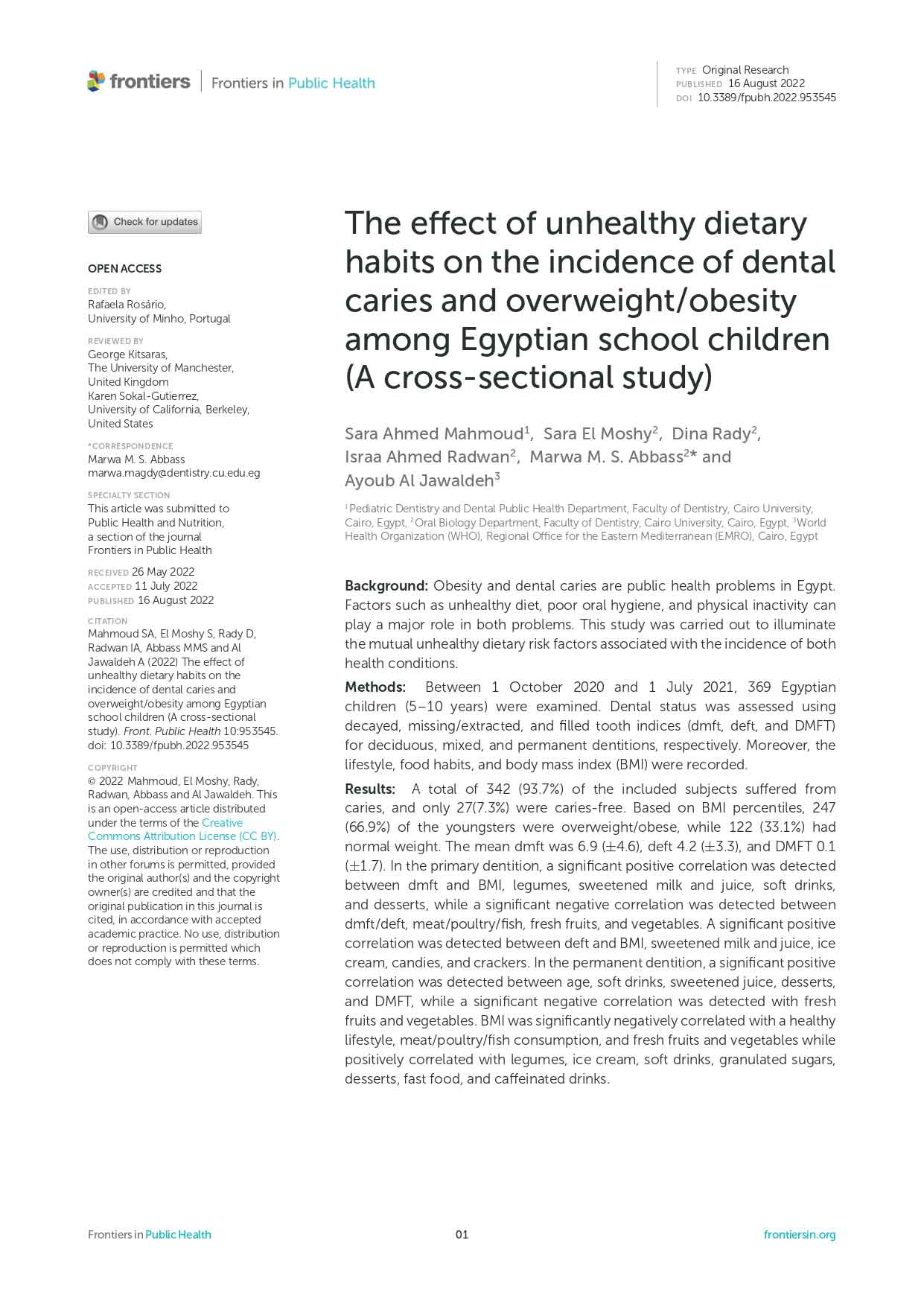
The effect of unhealthy dietary habits on the incidence of dental caries and overweight/obesity among Egyptian school children (a cross-sectional study)
Publication date: 2022
Obesity and dental caries are public health problems in Egypt. Factors such as unhealthy diet, poor oral hygiene, and physical inactivity can play a major role in both problems. This study was carried out to illuminate the mutual unhealthy dietary risk factors associated with the incidence of both health conditions. This study concludes that Overweight/obesity was positively correlated with primary dentition dental caries. Desserts and soft drinks could be the common risk factors associated with high caries and overweight/obesity incidence among Egyptian school children; conversely, consumption of fruits and vegetables could hinder both health conditions.
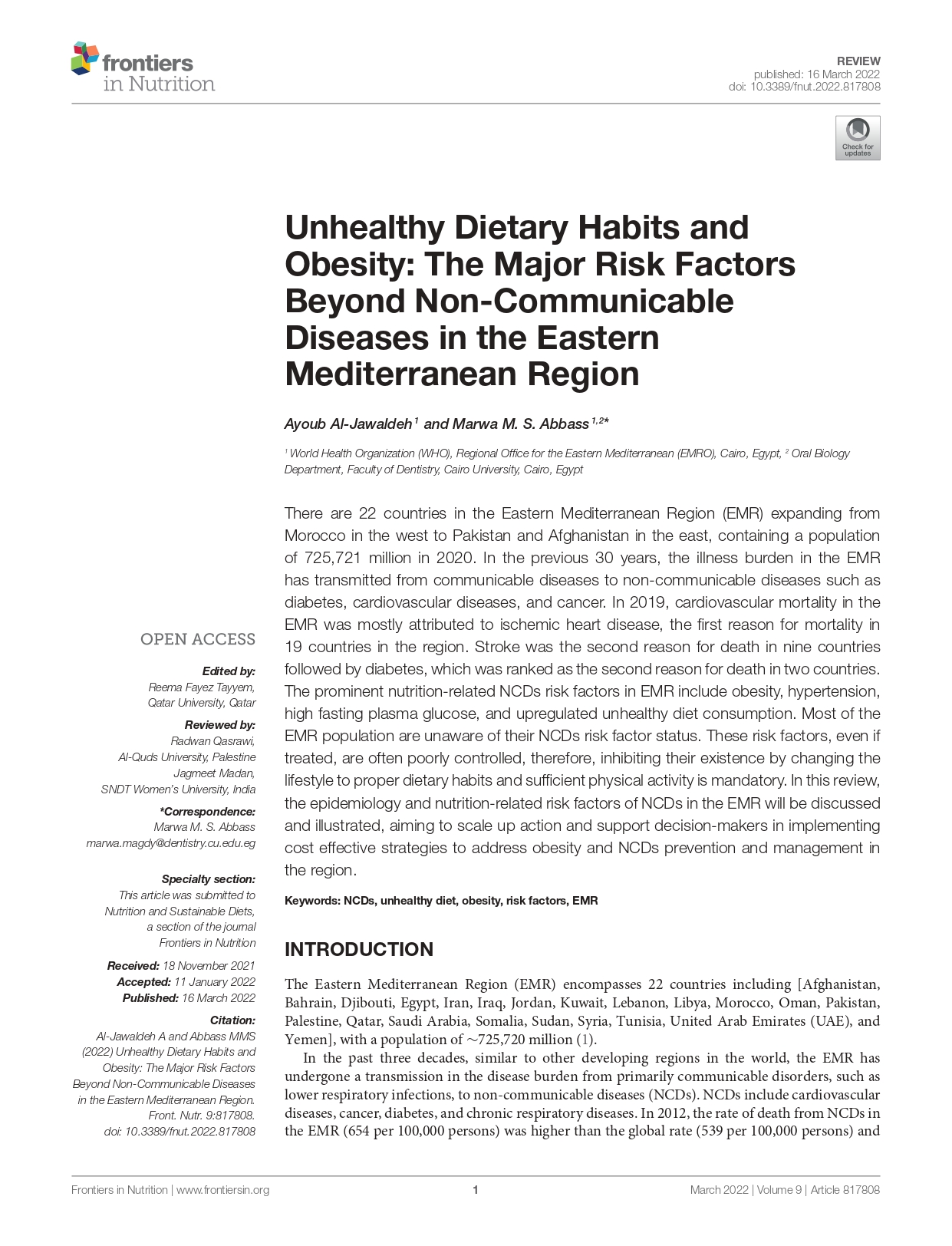
Unhealthy dietary habits and obesity: the major risk factors beyond non-communicable diseases in the Eastern Mediterranean Region
Publication date: 2022
Over the past 30 years, the illness burden in the Eastern Mediterranean Region (EMR) has been transmitted from communicable diseases to noncommunicable diseases (NCDs) such as diabetes, cardiovascular diseases, and cancer. This review discusses and illustrates the epidemiology and nutrition-related risk factors of NCDs in the EMR, aiming to scale up action and support decision-makers in implementing cost-effective strategies to address obesity and NCDs prevention and management in the Region.
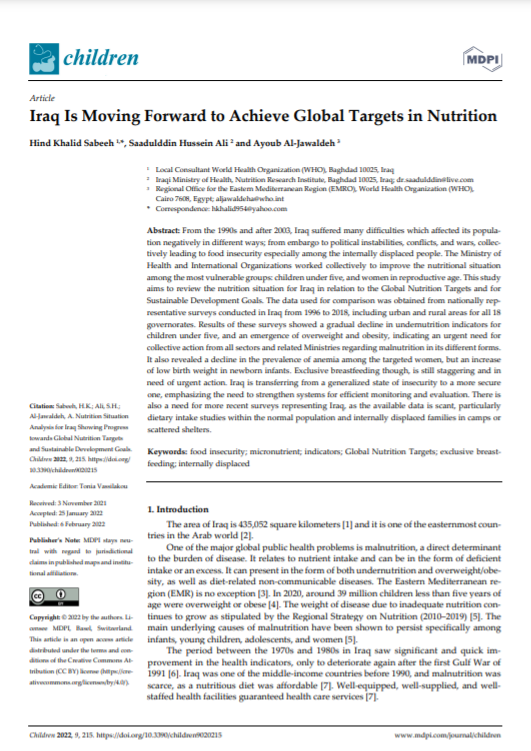
Iraq is moving forward to achieve global targets in nutrition
Publication date: 2022
From the 1990s and after 2003, Iraq suffered many difficulties which affected its population negatively in different ways; from embargo to political instabilities, conflicts, and wars, collectively leading to food insecurity, especially among the internally displaced people. This study aimed to review the nutrition situation for Iraq in relation to the Global Nutrition Targets and Sustainable Development Goals. Findings show a gradual decline in undernutrition indicators for children under five, a decline in the prevalence of anemia among the targeted women, and an increase of low birth weight in newborn infants. Exclusive breastfeeding is still staggering and in need of urgent action.
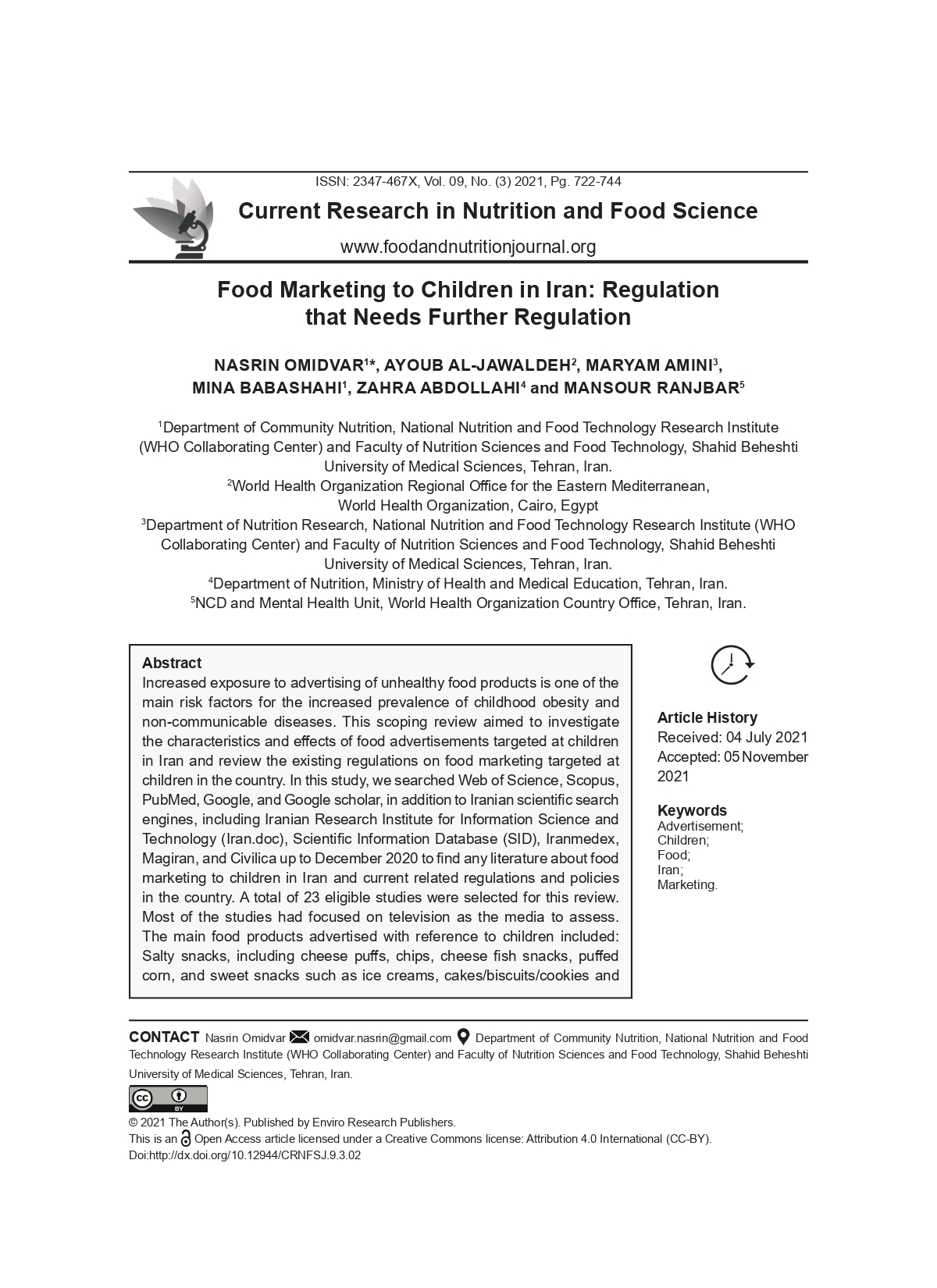
Food marketing to children in Iran: Regulation that needs further regulation
Publication date: 2021
Increased exposure to advertising unhealthy food products is one of the main risk factors for the increased prevalence of childhood obesity and noncommunicable diseases. This scoping review provided evidence and recommendations to the policy-makers and practitioners about controlling children’s exposure to unhealthy food advertisements. This review presented and discussed the current status of food marketing in Iran and the shortcomings of existing regulations. The study concluded that the policies and regulations in food marketing need to address children as an important audience. It is suggested future policies focused on children cover all forms of food marketing and consider all types of persuasive food marketing strategies targeted at children.
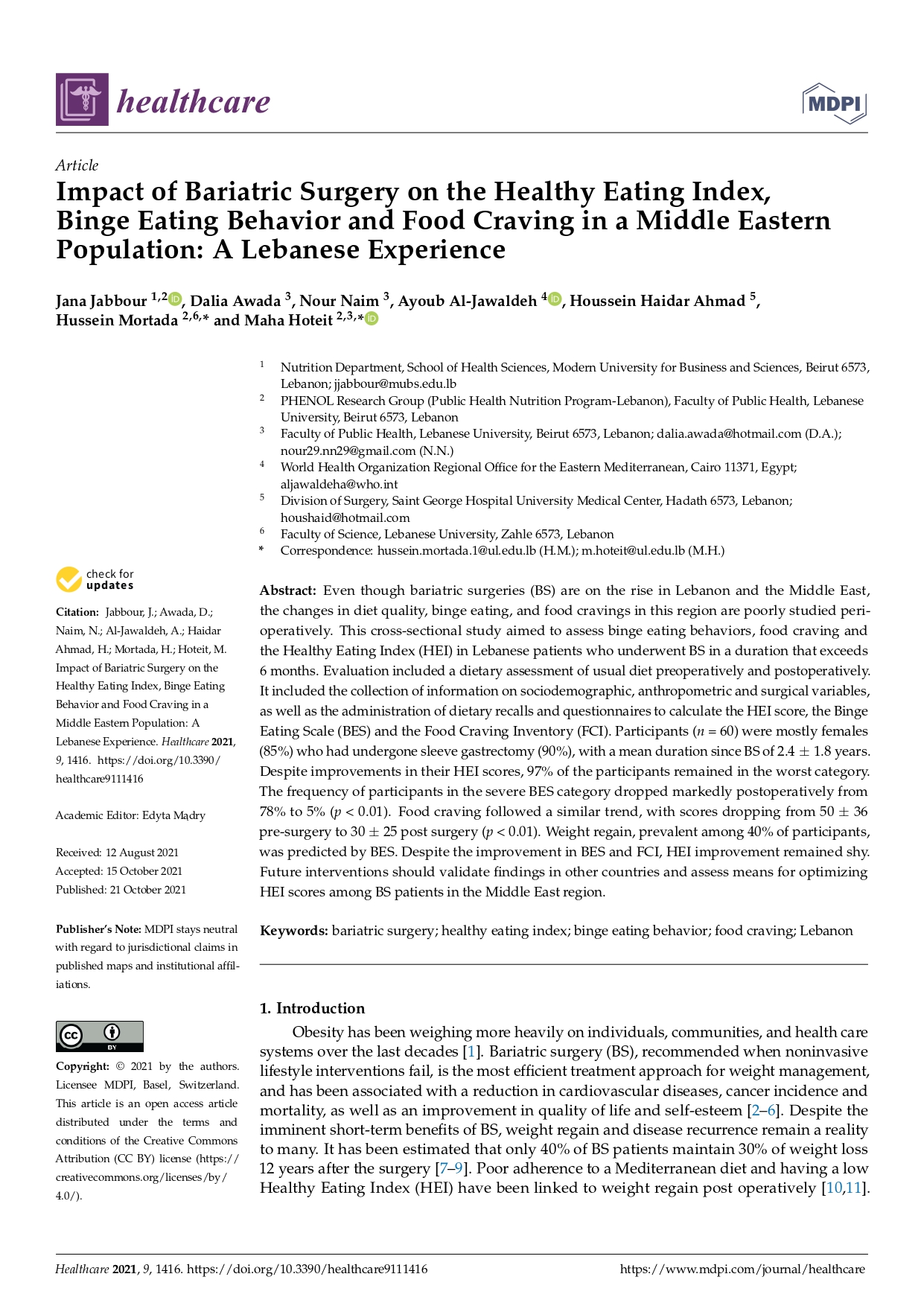
Impact of bariatric surgery on the healthy eating index, binge eating behavior and food craving in a Middle Eastern population: a Lebanese experience
Publication date: 2021
This cross-sectional study aimed to assess binge eating behaviors, food cravings and the healthy eating index in Lebanese patients who underwent bariatric surgeries in a duration that exceeds six months. The study concludes that despite the improvement in binge eating scale and food craving inventory, healthy eating index improvement remained shy. Future interventions should validate findings in other countries and assess means for optimizing healthy eating index scores among bariatric surgeries patients in the Middle East.
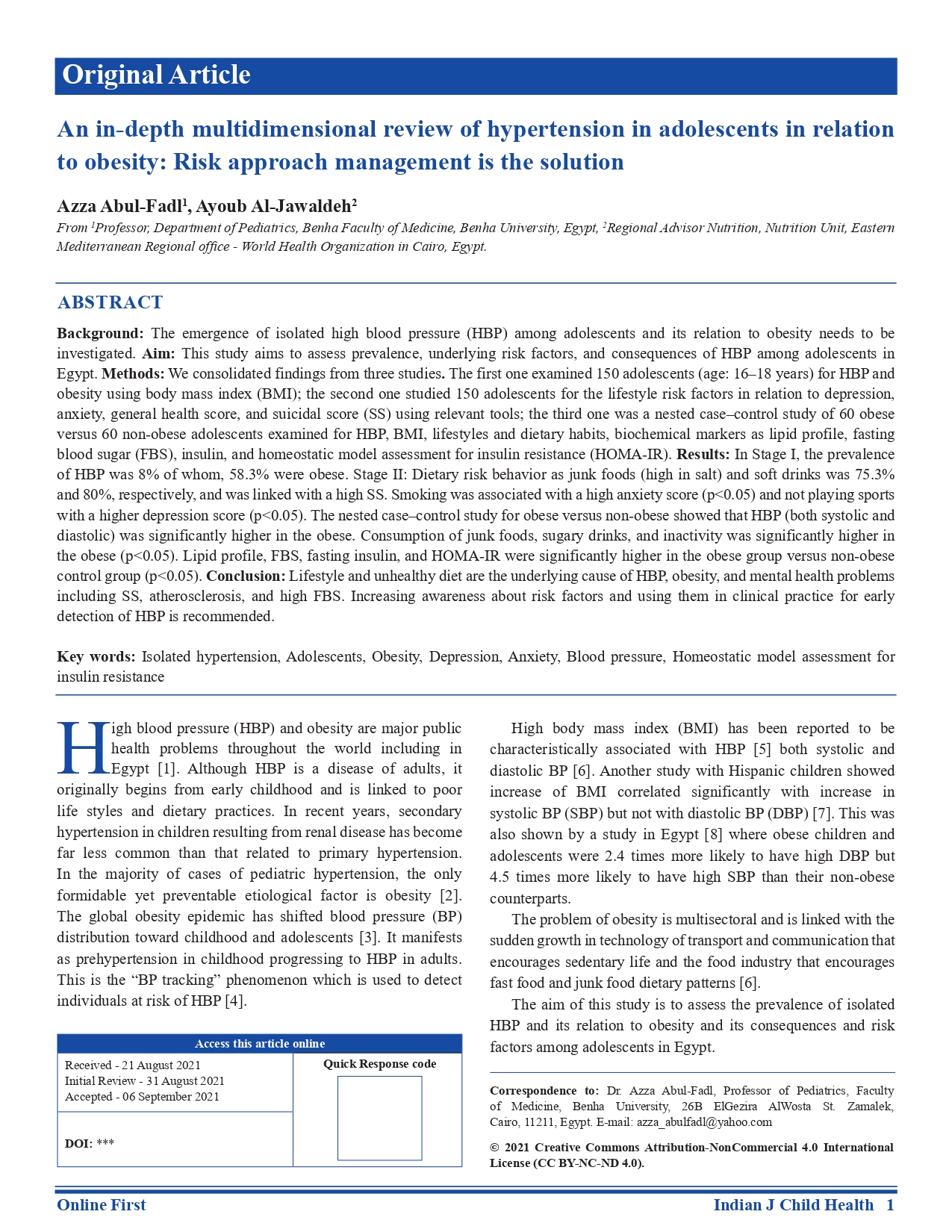
An in-depth multidimensional review of hypertension in adolescents in relation to obesity: risk approach management is the solution
Publication date: 2021
The emergence of isolated high blood pressure among adolescents and its relation to obesity needs to be investigated. This study aims to assess prevalence, underlying risk factors and consequences of high blood pressure among adolescents in Egypt. The study concludes that lifestyle and unhealthy diet are the underlying cause of high blood pressure, obesity and mental health problems including suicidal score, atherosclerosis and high fasting blood sugar. Increasing awareness about risk factors and using them in clinical practice for early detection of high blood pressure is recommended.
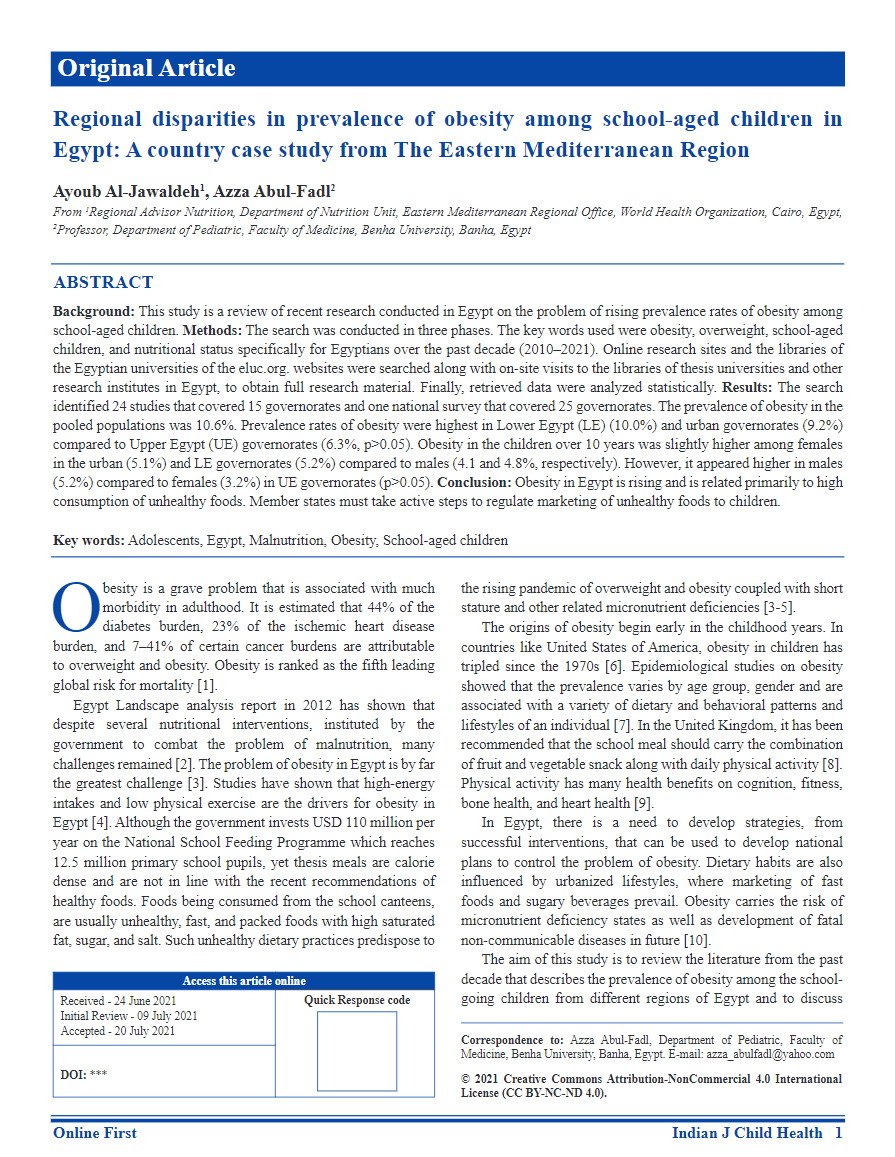
Regional disparities in prevalence of obesity among school-aged children in Egypt: a country case study from The Eastern Mediterranean Region
Publication date: 2021
Obesity is a grave problem that is associated with much morbidity in adulthood. The origins of obesity begin early in the childhood years. The aim of this study is to review the literature from the past decade that describes the prevalence of obesity among the school-going children from different regions of Egypt and to discuss some of the underlying factors that lead to the high prevalence of obesity in this age group. This study concludes that obesity in Egypt is rising and is related primarily to high consumption of unhealthy foods. Member states must take active steps to regulate marketing of unhealthy foods to children.
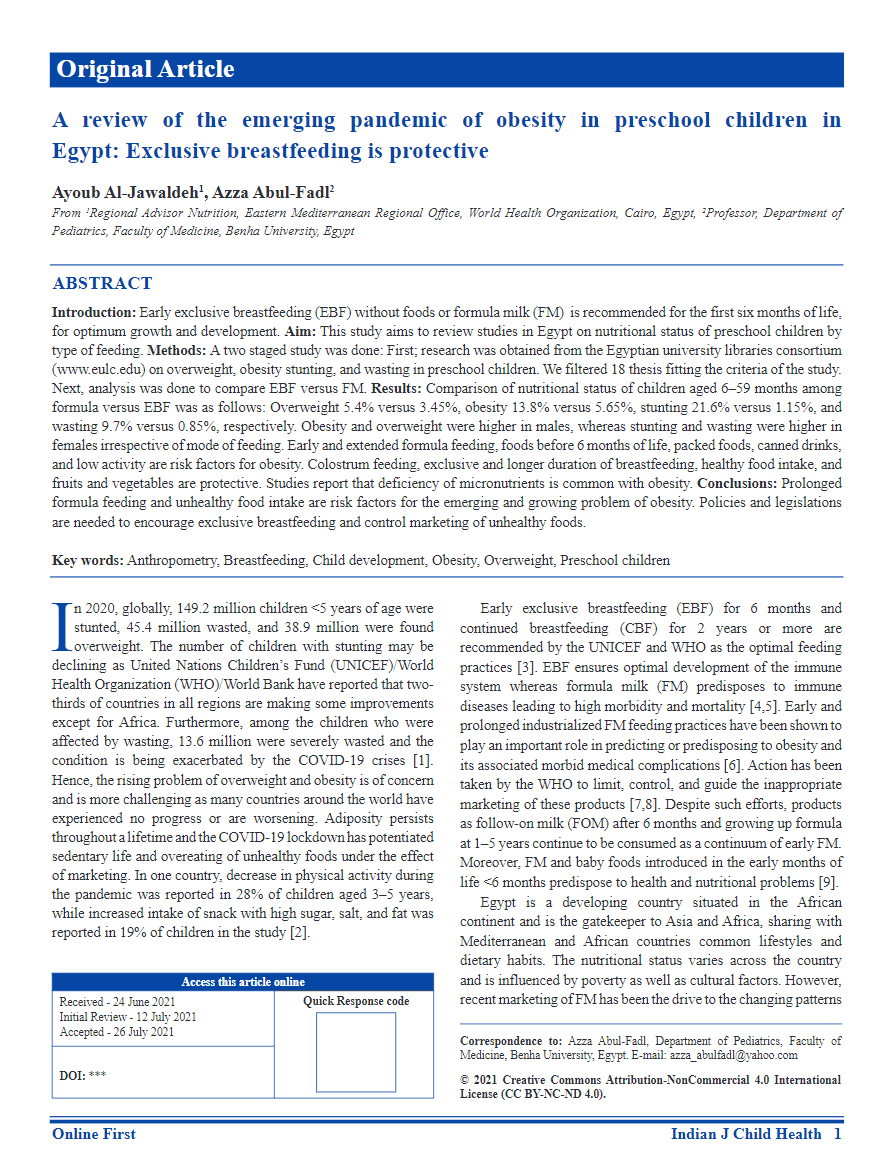
A review of the emerging pandemic of obesity in preschool children in Egypt: Exclusive breastfeeding is protective
Publication date: 2021
For optimum growth and development, early exclusive breastfeeding without foods or formula milk is recommended for the first six months of life. This study aims to review studies in Egypt on nutritional status of preschool children by type of feeding. The study concludes that prolonged formula feeding and unhealthy food intake are risk factors for the emerging and growing problem of obesity. Policies and legislations are needed to encourage exclusive breastfeeding and control marketing of unhealthy foods.
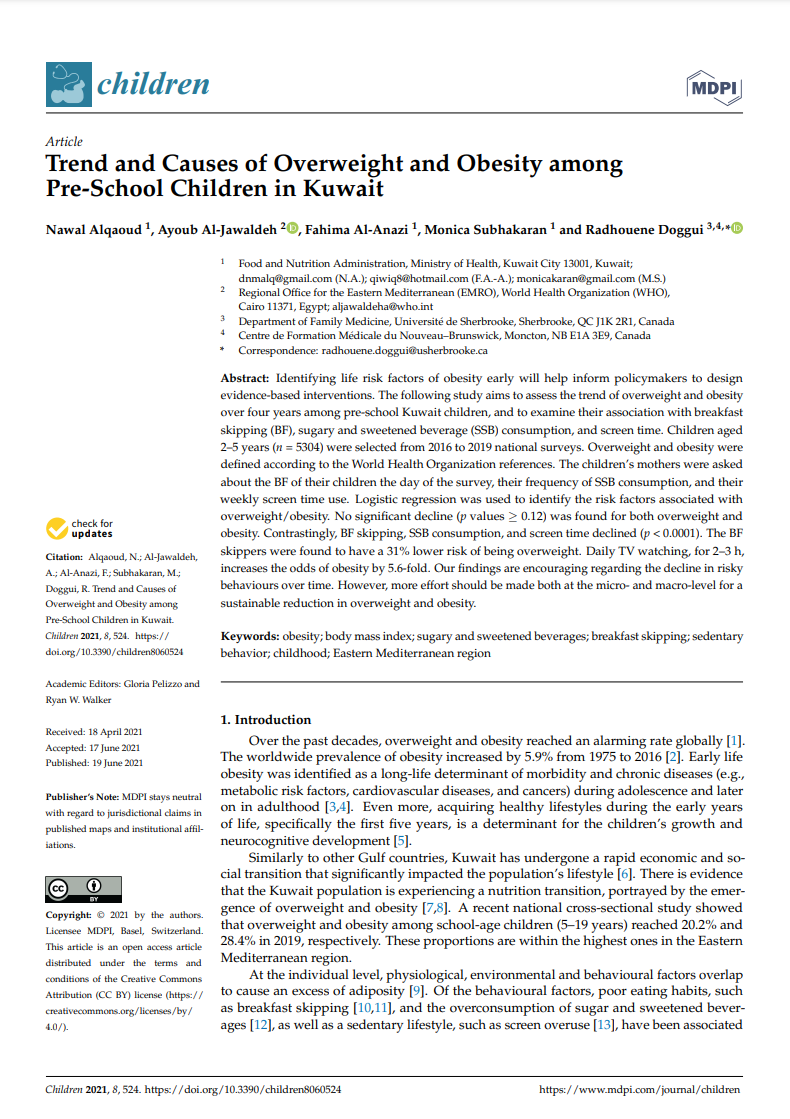
Trend and causes of overweight and obesity among pre-school children in Kuwait
Publication date: 2021
Identifying life risk factors of obesity early will help inform policymakers to design evidence-based interventions. This study aims to assess the trend of overweight and obesity over four years among pre-school Kuwait children, and to examine their association with breakfast skipping, sugary and sweetened beverage consumption and screen time. To conclude, this study underlines the impact of nutrition transition among Kuwait pre-school children. In this study, overweight and obesity prevalence did not decline over time, but there is a tremendous reduction in sugary and sweetened beverages (i.e., soft drinks by two-fold) as well as breakfast skipping over four years.
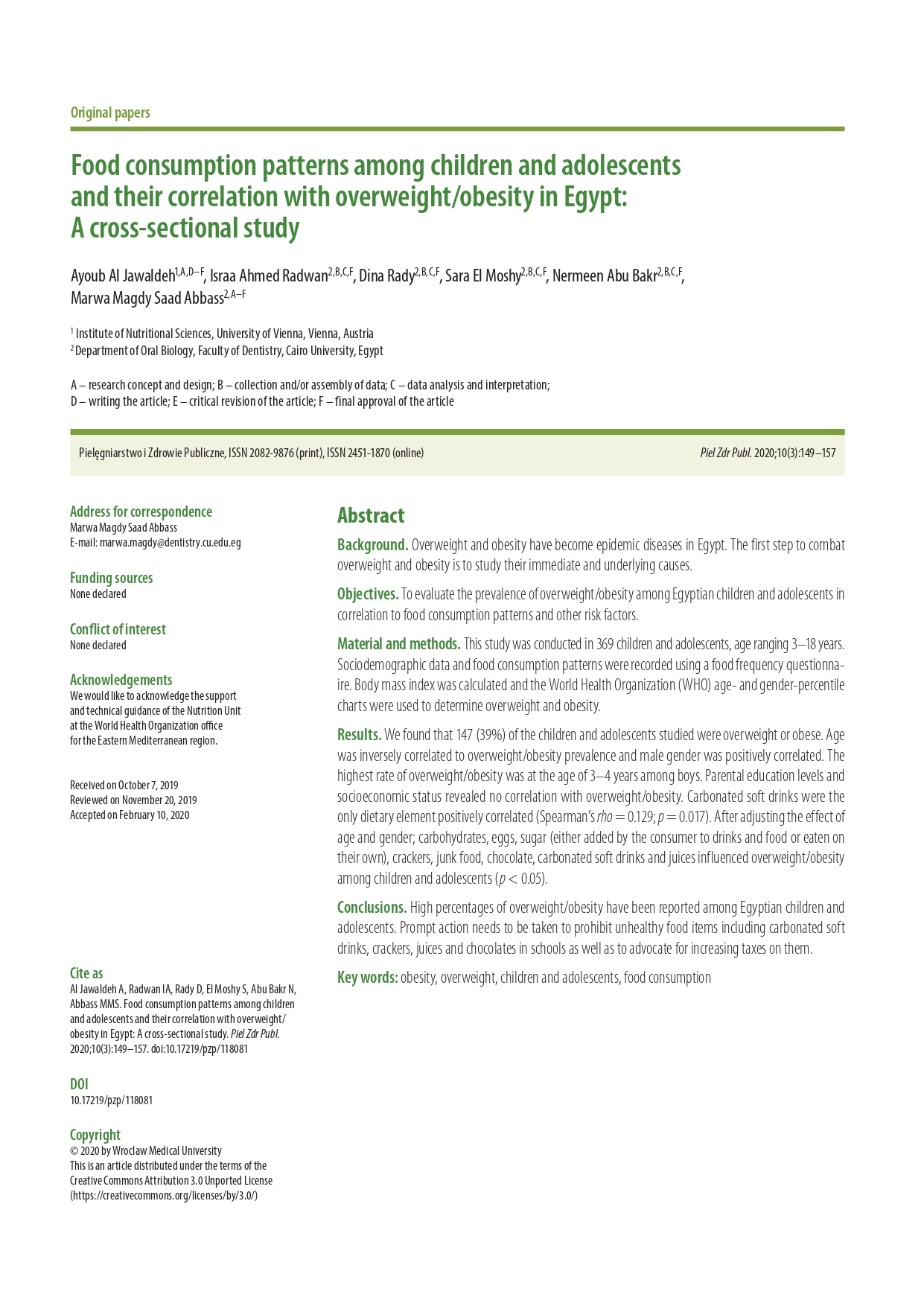
Food consumption patterns among children and adolescents and their correlation with overweight/obesity in Egypt: a cross-sectional study
Publication date: 2020
Overweight and obesity have become epidemic diseases in Egypt. This study aims to evaluate the prevalence of overweight/obesity among Egyptian children and adolescents in correlation to food consumption patterns and other risk factors. The study recommends that prompt action needs to be taken to prohibit unhealthy food items including carbonated soft drinks, crackers, juices and chocolates in schools as well as to advocate for increasing taxes on them.
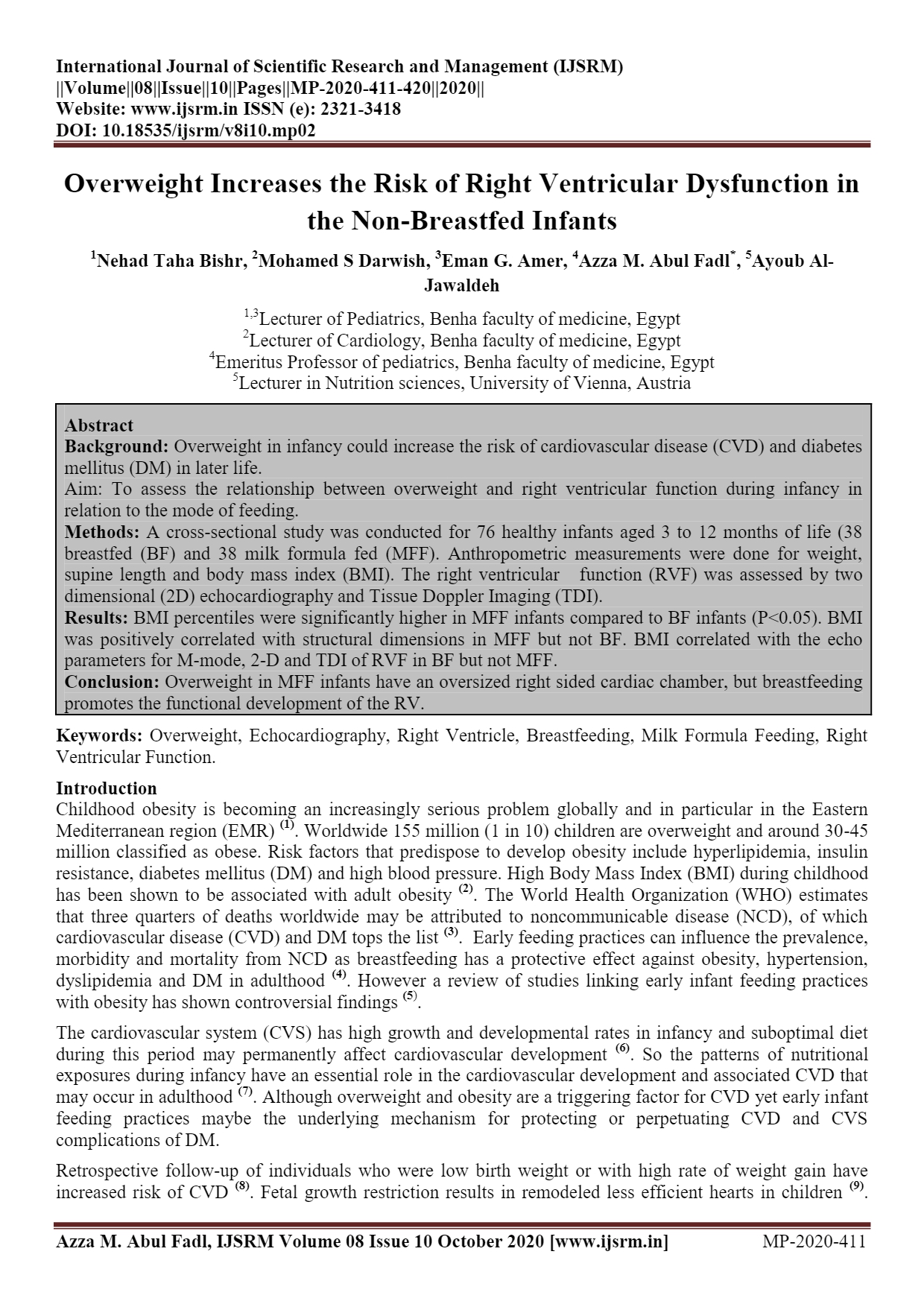
Overweight increases the risk of right ventricular dysfunction in the non-breastfed infants
Publication date: 2020
Overweight in infancy could increase the risk of cardiovascular disease and diabetes mellitus in later life, however the mechanisms need to be investigated. This study aims to assess the relationship between overweight and right ventricular function during infancy in relation to the mode of feeding. Overweight in milk formula fed infants increases right sided cardiac dimensions but in breastfed infants the functional component of the right ventricular functions is increased.
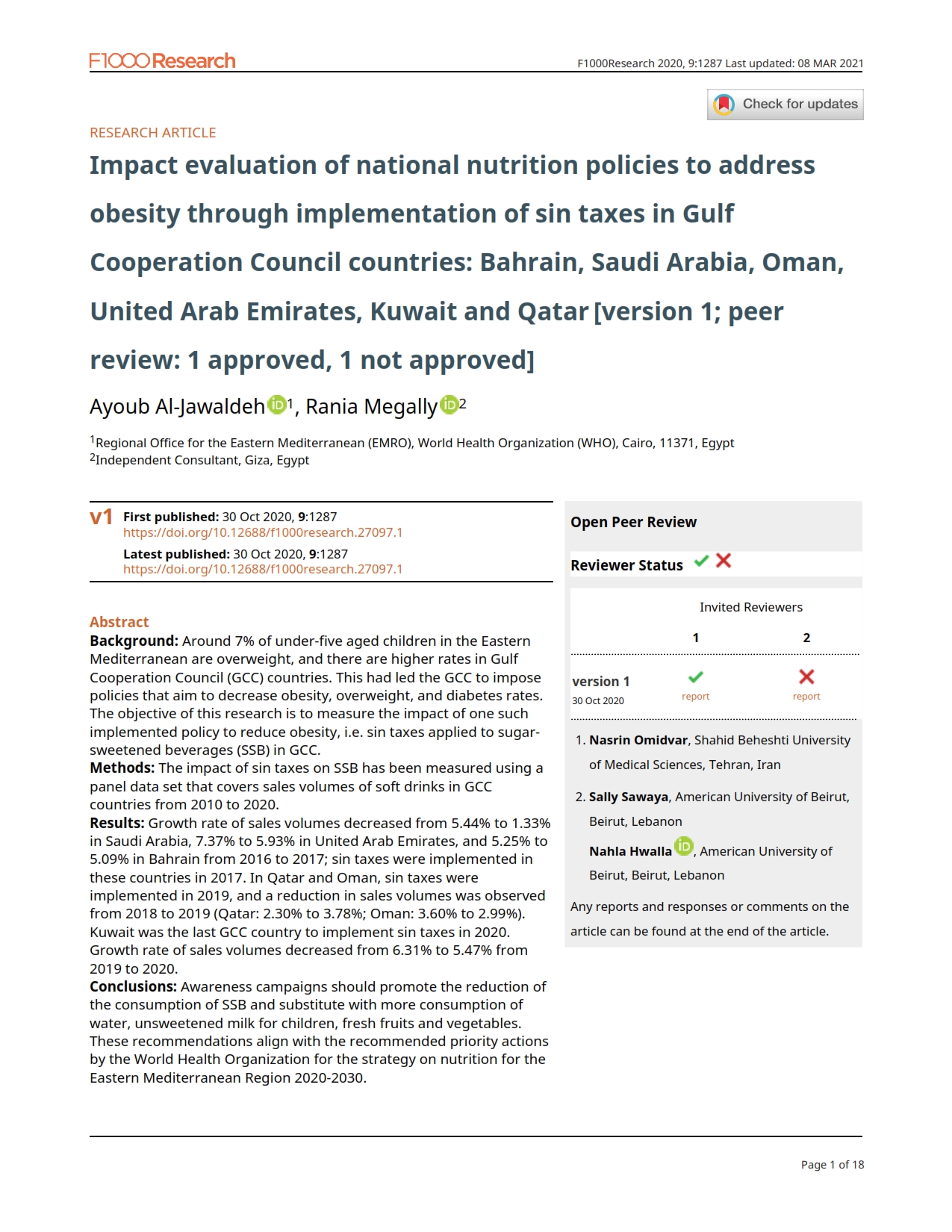
Impact evaluation of national nutrition policies to address obesity through implementation of sin taxes in Gulf Cooperation Council countries: Bahrain, Saudi Arabia, Oman, United Arab Emirates, Kuwait and Qatar
Publication date: 2020
Around 7% of under-five aged children in the Eastern Mediterranean are overweight, and there are higher rates in Gulf Cooperation Council (GCC) countries. This had led the GCC to impose policies that aim to decrease obesity, overweight, and diabetes rates. The objective of this research is to measure the impact of one such implemented policy to reduce obesity, i.e. sin taxes applied to sugar-sweetened beverages in GCC. Awareness campaigns should promote the reduction of the consumption of sugar-sweetened beverages and substitute with more consumption of water, unsweetened milk for children, fresh fruits and vegetables. These recommendations align with the recommended priority actions by WHO for the strategy on nutrition for the Eastern Mediterranean Region 2020-2030.
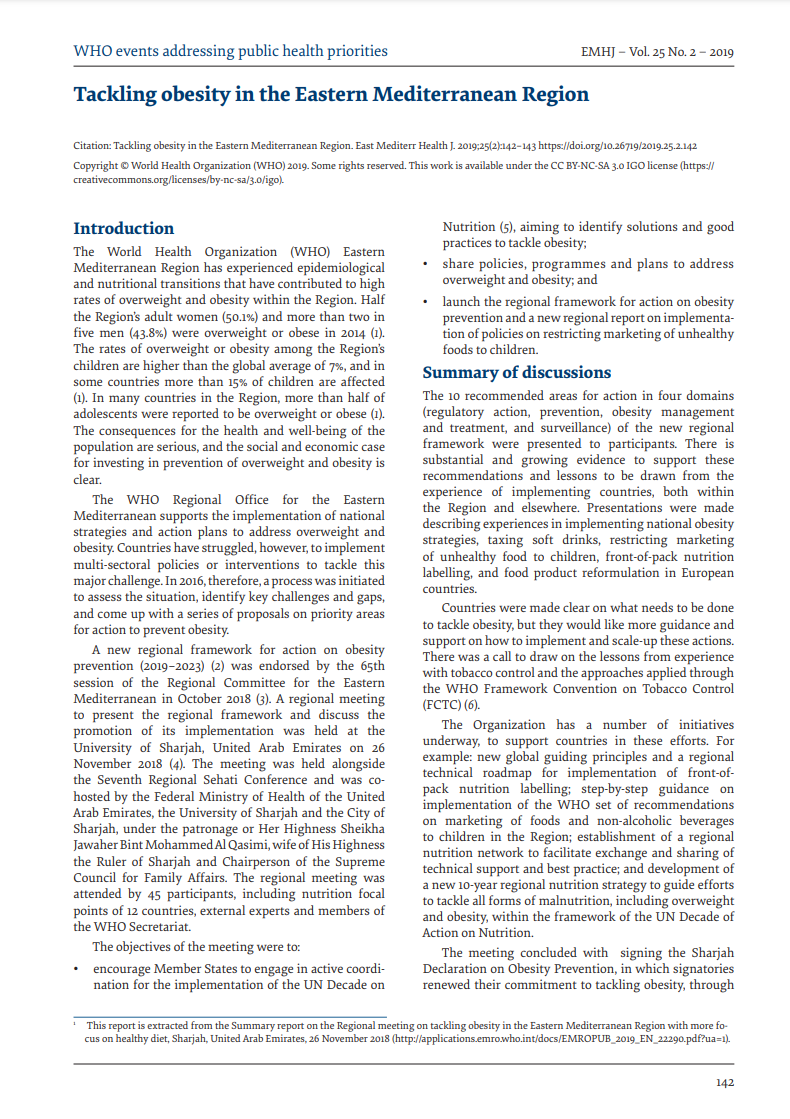
Tackling obesity in the Eastern Mediterranean Region
Publication date: 2019
This article summarizes the objectives, discussions and recommendations of the Regional meeting on tackling obesity in the Eastern Mediterranean Region with more focus on healthy diet, that was held in Sharjah, United Arab Emirates on 26 November 2018. The aim of the regional meeting was to present the regional framework for action on obesity prevention (2019–2023) and discuss the promotion of its implementation.
Regional policies on sugar intake reduction at population levels to address obesity in the Eastern Mediterranean
Publication date: 2018
Sugar intake has been reported to be associated with the increase in body weight and adiposity as well as several noncommunicable diseases. The aim of this review is to provide an updated summary on sugar consumption in the Eastern Mediterranean Region and to suggest strategies that help countries decrease their intakes, abiding by the new recommendations. This report concludes that most updated dietary guidelines and nutrition recommendations tend to only focus on white sugar that is added to food and drinks. The review suggests cutting down on all refined carbohydrates.
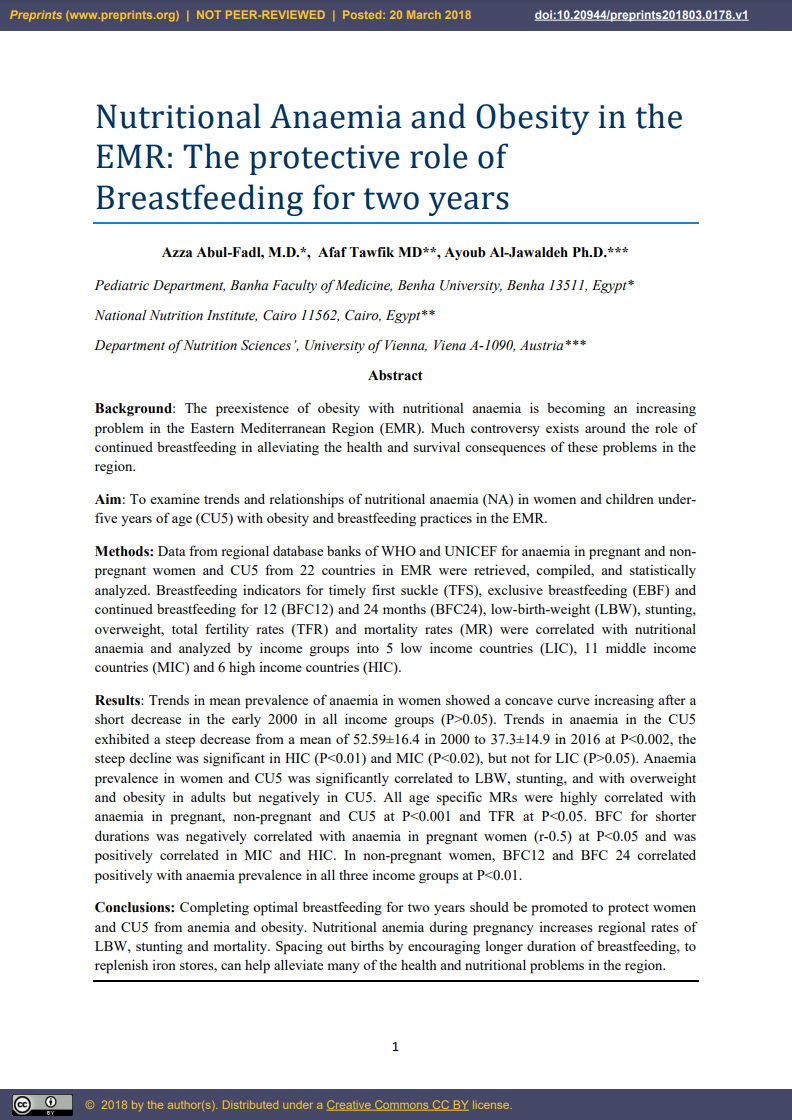
Nutritional anaemia and obesity in the Eastern Mediterranean Region: The protective role of breastfeeding for two years
Publication date: 2018
The aim of this study is to examine trends and relationships of nutritional anaemia in women and children under-five years of age with obesity and breastfeeding practices in the Eastern Mediterranean Region. Data from regional database banks of WHO and UNICEF for anaemia in pregnant and non-pregnant women and children under-five years of age were used. As a conclusion, completing optimal breastfeeding for two years should be promoted to protect women and children under-five years of age from anaemia and obesity. Nutritional anaemia during pregnancy increases regional rates of low birth weight, stunting and mortality.
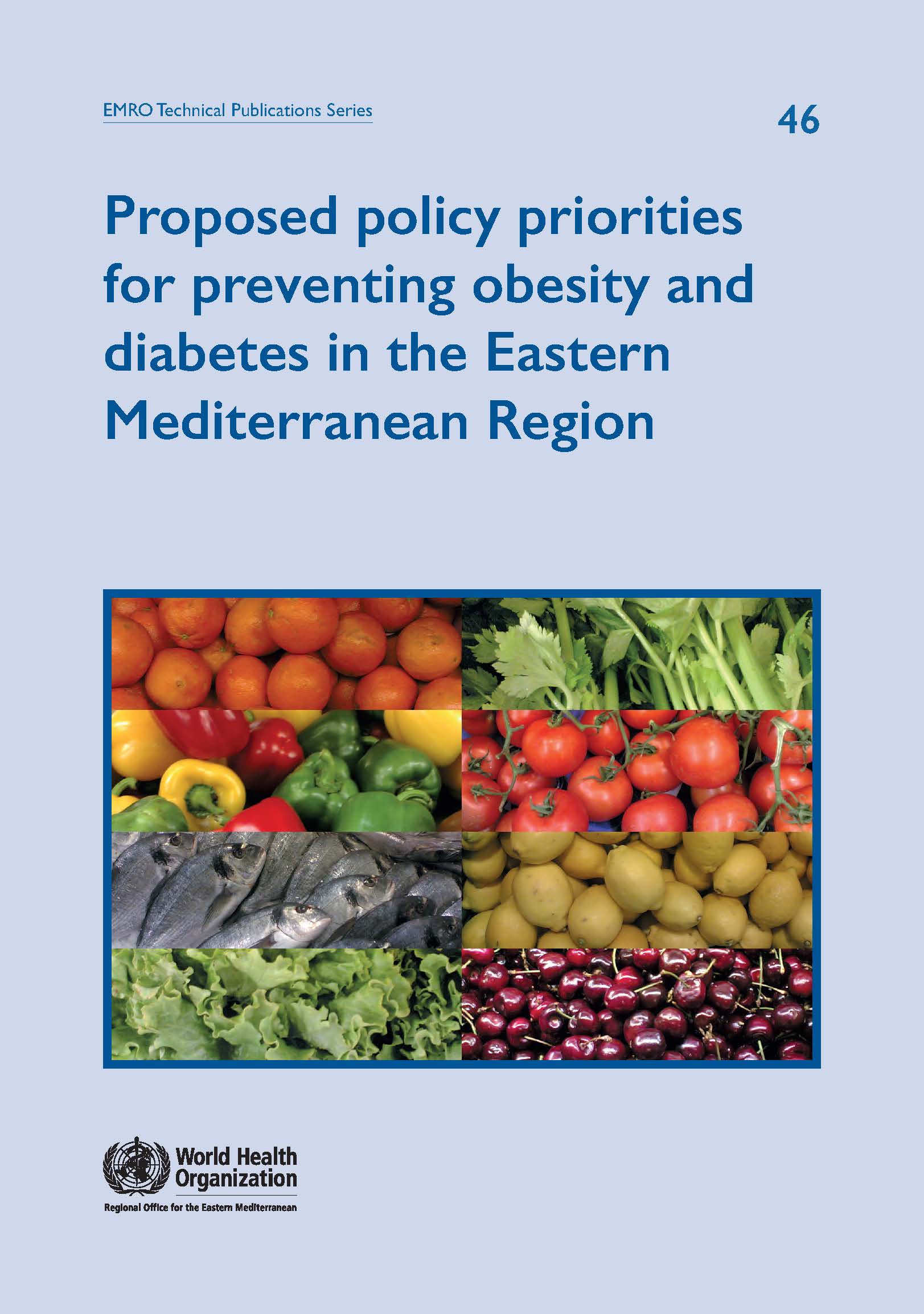
Proposed policy priorities for preventing obesity and diabetes in the Eastern Mediterranean Region
Publication date: 2017
The alarming and escalating burden of overweight, obesity and diabetes in the Eastern Mediterranean Region is closely linked to changing dietary patterns. Obesity and the most common type of diabetes are largely preventable and urgent action is needed to reduce exposure to their causal factors, such as unhealthy diet and physical inactivity. This document considers the recommendations of several recent initiatives on the prevention of obesity and diabetes and identifies priorities for an approach to reduce exposure to unhealthy dietary risk factors. It presents an initial proposal for 10 priority areas for action, which cover 37 strategic interventions to help prevent overweight, obesity and diabetes in the whole population, including children, adolescents and adults.





